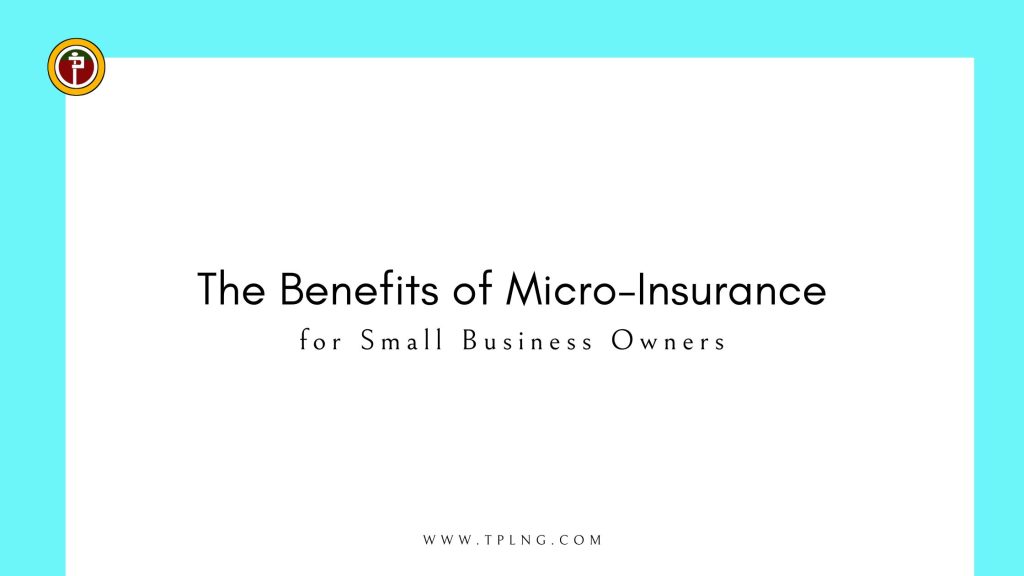In Nigeria, where a significant portion of economic activity comes from small and micro-businesses, risk management is essential for sustainability and growth. Small business owners frequently face challenges in accessing traditional insurance due to affordability and perceived complexity. This is where micro-insurance becomes invaluable, offering tailored, affordable, and accessible insurance solutions that meet the specific needs of small business owners.
In this article, we’ll explore what micro-insurance entails, its benefits for small business owners, and how it can help build resilience in Nigeria’s dynamic business environment.
Also read:
Micro-Insurance for Artisans and Tradesmen
Understanding Microinsurance in Nigeria: An Inclusive Financial Safety Net
8 Red Flags to Identify a Struggling Insurance Company
Common Pitfalls in Insurance Claims and How to Avoid Them
What is Micro-Insurance?
Micro-insurance is a type of insurance designed specifically to cover low-income individuals and small businesses that may not have access to standard insurance policies. It provides essential risk protection at a low premium, covering basic but crucial risks like property damage, health, life, disability, and crop failures.
The premiums are usually lower than those of traditional insurance policies, making them affordable for small businesses. Unlike traditional insurance policies, micro-insurance policies are often simpler, with easy-to-understand terms and minimal documentation requirements, which increases accessibility for business owners.
Key Benefits of Micro-Insurance for Small Business Owners
1. Affordability and Accessibility
Micro-insurance policies are designed to be financially accessible for small businesses that may struggle to pay for traditional insurance policies. Premiums are lower, and policies can often be paid in smaller installments. This affordability allows small business owners to protect their assets, even if they have limited capital.
2. Protection Against Unforeseen Events
For small businesses, the sudden loss of inventory, property damage, or a key person’s illness can be financially devastating. Micro-insurance provides coverage for such risks, helping to stabilize operations and reduce the financial impact of unforeseen events. By providing protection against these disruptions, micro-insurance gives business owners the ability to rebuild and continue operations even after setbacks.
3. Improved Business Stability and Growth
With the peace of mind that micro-insurance offers, business owners can focus on growth rather than constantly worrying about potential losses. This stability encourages investment in the business, from hiring more staff to expanding the range of products or services. When business owners are not living in constant fear of economic setbacks, they are more likely to make strategic decisions for long-term growth.
4. Access to Credit and Financial Services
Having an insurance policy, even a micro-insurance policy, can make small business owners more creditworthy in the eyes of financial institutions. Lenders are often more willing to provide credit or loans to businesses with insurance coverage, as it reduces the lender’s risk. Access to additional capital can support business expansion, equipment upgrades, or the development of new products and services.
5. Fostering a Culture of Financial Responsibility
Micro-insurance also contributes to building a financially responsible mindset among small business owners. By introducing them to the concept of risk management and planning, micro-insurance encourages small business owners to make informed financial decisions. This culture of responsibility can also extend to other areas of business operations, from budgeting to customer relationship management.
6. Resilience Against Climate-Related Risks
Many Nigerian small businesses, especially those in agriculture, are highly susceptible to climate-related risks, such as droughts, floods, and unpredictable weather patterns. Micro-insurance offers coverage for crop failures, livestock loss, and other environmental threats, which is essential for businesses whose revenues rely on stable environmental conditions. This coverage is increasingly vital as climate change introduces more volatility into traditional weather patterns, threatening the livelihoods of many entrepreneurs.
7. Encourages Formalization of Informal Businesses
Access to micro-insurance can encourage informal businesses to formalize their operations. To access insurance, many micro-insurance providers may require basic documentation, which indirectly fosters a formalization process. By formalizing, businesses gain access to additional financial services and support from government programs aimed at small and medium-sized enterprises.
8. Peace of Mind for Business Owners and Families
Many small businesses in Nigeria are family-run, which means that any impact on the business directly affects the family’s livelihood. Micro-insurance offers a safety net that helps families recover and move forward even after a financial loss. Knowing that their business is protected allows owners to operate with greater confidence and reduces stress.
9. Customizable and Tailored Coverage
Micro-insurance policies are often flexible and customizable, catering to the unique risks faced by specific sectors. For instance, retail businesses may prioritize protection for inventory, while those in agriculture may focus on crop and weather-related risks. Tailoring policies in this way ensures that business owners receive the coverage most relevant to their operations.
10. Ease of Enrollment and Claims Process
One of the barriers to traditional insurance is the complicated enrollment and claims process. Micro-insurance policies are designed to be more straightforward, with simpler enrollment and claims procedures. This ease of access and use means that more small business owners are willing to participate in micro-insurance programs, creating a broader safety net across the sector.
Also read:
Micro-Insurance for Artisans and Tradesmen
Understanding Microinsurance in Nigeria: An Inclusive Financial Safety Net
8 Red Flags to Identify a Struggling Insurance Company
Common Pitfalls in Insurance Claims and How to Avoid Them
Types of Micro-Insurance for Small Businesses
1. Life micro-insurance: Covers accidental death or disability
2. Health micro-insurance: Addresses medical expenses
3. Property micro-insurance: Protects against damage or loss
4. Liability micro-insurance: Covers third-party claims
5. Business interruption micro-insurance: Ensures continuity
Challenges and Opportunities
Despite benefits, micro-insurance faces challenges:
1. Awareness: Limited knowledge among small business owners
2. Accessibility: Difficulty reaching rural areas
3. Regulation: Need for clearer guidelines
In conclusion, micro-insurance holds tremendous promise for Nigeria’s small business sector. By offering accessible, affordable, and targeted protection, it empowers entrepreneurs to mitigate risk, focus on growth, and achieve greater resilience in the face of challenges.
As micro-insurance continues to evolve, it will play an increasingly vital role in Nigeria’s economic development, supporting small business owners and contributing to a more resilient economy.
Through awareness, collaboration, and continuous innovation, micro-insurance can become a lifeline for small business owners across Nigeria. Transparent Protection Ltd remains committed to educating the public and empowering entrepreneurs with the knowledge they need to harness the benefits of insurance effectively.
Take advantage of the next article, subscribe now!
Have questions about claim settlements or need assistance with your insurance policy? Our team is here to help! Reach out to us via email at info@tplng.com or give us a call at 0905-776-6182. We’re committed to ensuring genuine claim settlements and supporting our valued members.
TPL, your satisfaction is our priority




